| Srl | Item |
| 1 |
ID:
072236
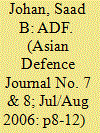

|
|
|
| 2 |
ID:
018749
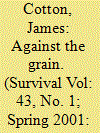

|
|
|
|
|
| Publication |
2001.
|
| Description |
p127-142
|
|
|
|
|
|
|
|
|
|
|
|
|
|
|
|
| 3 |
ID:
138723
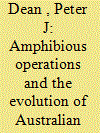

|
|
|
|
|
| Summary/Abstract |
Since its European settlement in 1788, Australia has been dependent on great-power protectors for its security. Initially this security was achieved by virtue of Australia’s status as a British colony, later as a member of the British Commonwealth. In return for its protection, Australia committed military forces in support of British interests to the Sudan, in the Boer War, and in the First and Second World Wars. Australian support for these actions was premised on two key factors: Australia’s membership in the Empire (and with that the identity of its citizens as “independent Australian-Britons”) and the assessment, universal among Australians, that support and protection of the Empire and of British interests were also in their interest
|
|
|
|
|
|
|
|
|
|
|
|
|
|
|
|
| 4 |
ID:
007196
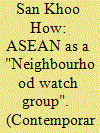

|
|
|
|
|
| Publication |
Aug 2000.
|
| Description |
279-301
|
|
|
|
|
|
|
|
|
|
|
|
|
|
|
|
| 5 |
ID:
019991
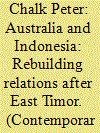

|
|
|
|
|
| Publication |
Aug 2001.
|
| Description |
233-253
|
|
|
|
|
|
|
|
|
|
|
|
|
|
|
|
| 6 |
ID:
017478
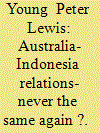

|
|
|
|
|
| Publication |
Sept 2000.
|
| Description |
5-7
|
|
|
|
|
|
|
|
|
|
|
|
|
|
|
|
| 7 |
ID:
051929
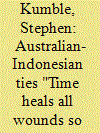

|
|
|
| 8 |
ID:
051862
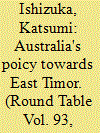

|
|
|
| 9 |
ID:
078177
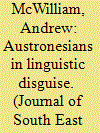

|
|
|
|
|
| Publication |
2007.
|
| Summary/Abstract |
This paper explores the relationship between language and cultural practice in the Fataluku language community of East Timor. A Papuan language and member of what is referred to as the Trans New Guinea Phylum (TNGP) of languages, Fataluku society nevertheless exhibits many cultural ideas and practices suggesting a long period of engagement and accommodation to Austronesian cosmopolitanism. The idea that Fataluku speakers are 'Austronesians in disguise' points to the significance of cultural hybridity on the Austronesian boundary
|
|
|
|
|
|
|
|
|
|
|
|
|
|
|
|
| 10 |
ID:
073641
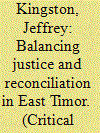

|
|
|
|
|
| Publication |
2006.
|
| Summary/Abstract |
As East Timor emerges from a long Indonesian nightmare, it is seeking to balance the agendas of justice and reconciliation. The verdict on justice for East Timor is one of disappointment. The main obstacle to accountability is Indonesia, abetted by an international community that seeks its assistance in the "war on terror." East Timor's leaders have emphasized reconciliation while promoting a healing process and good governance. Recent violence reveals just how difficult this task remains. The hybrid tribunal established in East Timor by the UN was once heralded as an important innovation in transitional justice, avoiding the high cost and lengthy proceedings of other international tribunals. However, the tribunal has been unable to hold accountable those who bear the greatest responsibility for outrages committed against Timorese and defendants did not get fair trials or competent defense. A truth commission report released in December 2005, Chega! (Enough), emphasizes justice and reparations. The political leadership soft peddles justice because they believe this makes more sense and will better serve the people. Indonesians are now being given a chance to testify in front of the Commission of Truth and Friendship (CTF), but concern is widespread concern that the CTF emphasizes reaching closure, has no judicial mandate, and only ensures impunity for ranking perpetrators. Indonesia and East Timorese can regain dignity and move beyond their shared tragedy through a process of reconciliation that is based on justice and atonement. Germany shows this is possible; Japan, that it is difficult and problematic if neglected.
|
|
|
|
|
|
|
|
|
|
|
|
|
|
|
|
| 11 |
ID:
020252
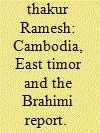

|
|
|
|
|
| Publication |
Autumn 2001.
|
| Description |
115-124
|
|
|
|
|
|
|
|
|
|
|
|
|
|
|
|
| 12 |
ID:
021681
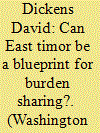

|
|
|
|
|
| Publication |
Summer 2002.
|
| Description |
29-40
|
|
|
|
|
|
|
|
|
|
|
|
|
|
|
|
| 13 |
ID:
082600
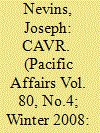

|
|
|
|
|
| Publication |
2008.
|
| Summary/Abstract |
This article provides an overview of, and analyzes, how the final report of East Timor's Commission on Reception, Truth and Reconciliation (CAVR) treated matters of responsibility for gross human rights abuses, accountability and reconciliation. While the article acknowledges the value of the report, it highlights Chega!'s limitations. The CAVR did not go as far as it could and should have in analyzing responsibility for atrocities and recommending amends. In making this argument, this article moves beyond relatively conventional analyses of reconciliation that focus on individuals and their attitudes, values and beliefs, and overlook collective and material forms of violence and injustice. Instead, it focuses on state actors, particularly those beyond Indonesia, who aided and abetted Jakarta's crimes, while advocating a wide-ranging analysis and repair of the associated damage. In doing so, the article contends that reparations for the damage must go beyond the immediate conflict so that those persons, groups or institutions whose privilege in part derived from East Timor's victimization also provide amends. It thus champions the notion that reconciliation and redistributive justice are inextricably linked
|
|
|
|
|
|
|
|
|
|
|
|
|
|
|
|
| 14 |
ID:
108082
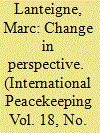

|
|
|
|
|
| Publication |
2011.
|
| Summary/Abstract |
To understand China's change in position regarding UN peacekeeping, the country's internal debates and policy towards the UN operations in East Timor from 1999 to 2002 comprise an essential case study. Despite its traditional concerns about the sanctity of state sovereignty, China was willing to support and contribute personnel to East Timor peacekeeping missions. This was a result of its growing confidence in addressing regional strategic issues, its development of the 'New Security Concept', which encourages cooperative solutions to strategic issues, and its desire to remake its regional identity to reflect a more conservative and pragmatic approach to regional peacebuilding. This change in policy not only allowed China to become more at ease with UN peacekeeping participation, but also contributed much to the country's Asia-Pacific diplomacy, which increasingly stressed multilateralism and partnership.
|
|
|
|
|
|
|
|
|
|
|
|
|
|
|
|
| 15 |
ID:
154711
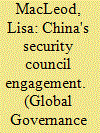

|
|
|
|
|
| Summary/Abstract |
This essay argues that UN Security Council responses to internal armed conflict are the product of the interests as well as the causal and principled beliefs of its engaged permanent members. As China has grown from a regional to a global actor, it has become a more active participant in Council deliberations. The cases of East Timor and Darfur highlight the ways in which Council decisions have come to reflect Chinese understanding of the causes of peace and conflict and appropriate peace strategies. The future of UN peace operations will depend on the ability of the Council's engaged participants to discover shared interests and points of convergence in their causal and principled beliefs.
|
|
|
|
|
|
|
|
|
|
|
|
|
|
|
|
| 16 |
ID:
184221
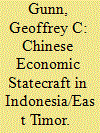

|
|
|
|
|
| Summary/Abstract |
From inside China’s Belt and Road Initiative (BRI), two southern tier nations offer contrary perspectives as to the efficacy of Beijing’s economic statecraft, namely Indonesia and East Timor. While obviously asymmetric in practically every respect, nevertheless a careful study of these two nations’ bilateral links with China over long and short times offers salutary lessons on infrastructure financing in particular. Several interconnected inquiries are interposed. In a nation known for its competing political elites and support bases, how successful has China been in micro-managing its relations with Jakarta over trade and investment deals even carrying through to a post-authoritarian order? How has newly independent albeit aid-dependent Timor-Leste been able to parlay the China connection? Mixing documentary with primary research in situ, the inclusion of the East Timor case adds a missing link in the growing literature on the BRI.
|
|
|
|
|
|
|
|
|
|
|
|
|
|
|
|
| 17 |
ID:
023413
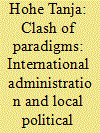

|
|
|
|
|
| Publication |
Dec 2002.
|
| Description |
569-689
|
|
|
|
|
|
|
|
|
|
|
|
|
|
|
|
| 18 |
ID:
122602
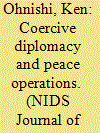

|
|
|
|
|
| Publication |
2012.
|
| Summary/Abstract |
This paper analyzes the activities of the International Force for East Timor (INTERFET) from the
perspectives of compellence and coercive diplomacy with the recognition that the proactive use of
force is also effective in peace operations and the appropriate concept underpinning such actions is
coercion, particularly compellence and coercive diplomacy. After a referendum on independence
from Indonesia in August 1999, East Timor was thrown into confusion by large-scale destruction
and forced displacement of residents by anti-independence militias. INTERFET that intervened to
restore security to East Timor used its military force to proactively put pressure on militias and
part of Indonesian troops to induce them to alter their actions. These behaviors of INTERFET can
be captured in line with the structure of coercive diplomacy and INTERFET's high-level military
capability and the existence of its clear objectives can be cited as factors contributing to its success.
As suggestions for peace operations in general, it can be pointed out that coercion by denial, rather
than by punishment, seems to be more effective in the context of peace operations and that it is
necessary to practice threats of denial across all areas of operations.
|
|
|
|
|
|
|
|
|
|
|
|
|
|
|
|
| 19 |
ID:
019706
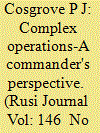

|
|
|
|
|
| Publication |
Feb 2001.
|
| Description |
31-35
|
|
|
|
|
|
|
|
|
|
|
|
|
|
|
|
| 20 |
ID:
022318
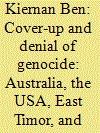

|
|
|
|
|
| Publication |
June 2002.
|
| Description |
163-192
|
|
|
|
|
|
|
|
|
|
|
|
|
|
|
|